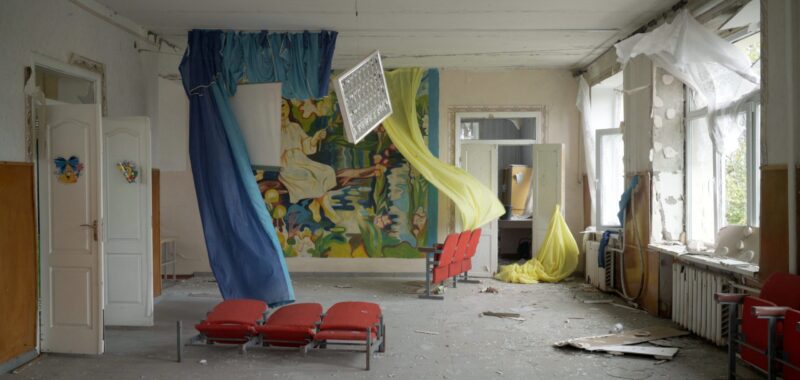Since Russia invaded Ukraine in early 2022, Ukrainian intelligence has recorded thousands of private phone calls made by Russian soldiers to friends and family back home. In the new documentary Intercepted (2024), director Oksana Karpovych pairs these conversations with images of post-battle scenes around Ukraine. The film is a feature-length study in the tensely liminal interludes of war, when mundane situations are scarred by recent violence and haunted by the potential for more violence to come.
The film travels in a roughly clockwise geographic arc across its running time, beginning with scenes shot north of Kyiv before moving south and east, often edging close to combat zones — sometimes filming right after fighting — and concluding in Kharkiv not long after Russian forces were driven out of the city. The Russian phone calls are public information, released by Ukrainian authorities since early in the war. Karpovych combed through around 30 hours of audio for the clips used in the movie.
Intercepted posits a twinned dialectic between sound and image and between invader and invaded. Ukrainians are represented through what is seen, Russians through what is said. The tableaus are nearly always long, still takes, with the exception of some panning shots, and usually do not feature human figures. There’s a recurrent motif of curtains blowing in otherwise static scenes — blasted-out kitchens, classrooms, and living rooms in eerie post-traumatic repose. And there is often an ironic counterpoint between the phone calls and the scenes they overlay. In one shot, for instance, a man smokes in a kitchen and simply stares out the window, performing one of the most mundane acts one can think of. In the overlaid audio, however, a Russian soldier claims to the woman he’s calling (most likely his mother) that whenever he and his squad mates rough up Ukrainian civilians, they don’t express any pain, dehumanizing them.

References to murder, rape, and myriad other possible war crimes are rife throughout the phone calls. That these men are mostly talking to family members, and almost always female ones — mothers, wives, girlfriends — makes for a disquieting glimpse into the synchronicity between military monstrosity and the civilian society that it grows out of. The soldiers tend to receive gentle understanding, if not outright approval, from their callers. A shelling can be referenced as casually as the weather.
The film’s emphasis on Russian depravity in the calls it uses is matched with those that speak to the toughness of Ukrainian soldiers and civilians. In the aforementioned scene of a man smoking, the woman talking to the soldier says that their opponents are “even tougher than the fascists were,” referring to World War II. The propagandistic element is unmistakable. One shot presents a half-ruined building that nonetheless flies several unblemished Ukrainian flags, a readymade symbol of national defiance against invasion. Much of Intercepted comprises similarly blunt messaging — understandable, given the stark situation of war. In its imagining, on the charred border between countries at war, atrocity literally whispers in the air.

Intercepted (2024), directed by Oksana Karpovych, is screening at Film Forum through October 10.

